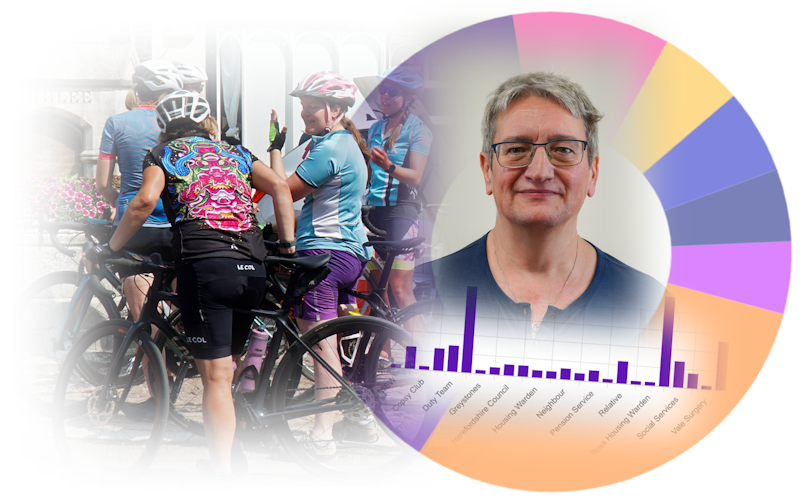
Leaders and technology
**We wish all customers, staff and partners who celebrate it a very Merry Christmas and a Happy New Year!**
Blog
A blog by Leonie - Charitylog's communications lead
In life before Charitylog I’ve worked for both a large city council and two small charities.
I know that last-minute panic of getting a bid for desperately needed funding over the line.
And, as a local authority employee working closely with voluntary sector partners, I’ve also experienced the sinking feeling of battling through a waffly, confusing submission – the sort that makes you die a little bit inside.
I’m certainly no expert, compared to many. But having been on both sides, I thought I’d offer up my top tips.
These won’t be news to anyone well-versed in funding bids. But they might help someone just starting down this road, or who has had a bid rejected and isn't sure why.
Yes, it’s a cliché - but good prep really does make all the difference.
Read the whole application form and any guidelines (you’d be surprised how many people don’t!). Check your project is eligible - and appropriate - for this type of funding.
Research your funder and think about getting in touch with them before you submit. In some cases, you may be able to introduce your project and ask questions about the application. This already gives you a head start!
Talk to trustees and any well-connected volunteers or patrons, as appropriate. You never know how people are connected or who might be able to offer useful advice.
Jot down notes before you start to fill in the form. At the end of the day, funders want to know how their grant will make a positive change. You'll need to show:
what value the project brings (or will bring) compared with what happens now
who will benefit, and how?
how the broader community will benefit (can local partners signpost or refer?)
any sustainability/green credentials
how the funding will directly help you achieve the outcomes
what will happen if your bid isn’t successful.
Fully answer each question - but avoid waffle, vagueness or repetition. Back up any claim you make.
Use plain English and avoid jargon and acronyms (apart from well-known ones like NHS).
Make your bid emotionally engaging, using case studies, examples and data (where possible) to build a strong, compelling case.
Focus on outcomes and the people they affect. Convey the urgency of the need, and why you’re best placed to address it. Let your passion shine through!
Funders are busy, so make sure your outcomes clearly link to their objectives or criteria.
Make sure they can see:
What your charity/project is
what kinds of support it offers
how this is provided, and
to whom.
Proofread your application! Or, even better, ask someone else you trust to check it through. A fresh perspective is always helpful.
Figures, ideally presented in tables, charts or diagrams, will make your case more persuasive.
For example, if your charity is supporting more people month-on-month then show this, breaking down to percentages and including graphs.
If you use a CRM like Charitylog, you can create professional-looking reports and graphs showing detailed demographic breakdowns.
Use local and national statistics to support your case. The Office of National Statistics provides a helpful tool for creating custom data sets, and NHS England Digital (previously NHS Digital) has a wealth of data too.
Strengthen your case by quoting from relevant reports, reviews etc, as appropriate. Depending on your project or area, this might include:
local or national strategies and wellbeing plans
joint strategic needs assessments
consultation feedback
reports from infrastructure organisations
Healthwatch data
Health & Wellbeing Board minutes
Reports by research bodies such as the King’s Fund, Nuffield Trust and National Institute for Health and Care Research.
Prepare a budget including all your envisaged, planned expenses (allowing for inflation). Show clearly how your project presents good value for money.
If you have previous experience with similar projects that went well, include this budget data too.
It’s also a great idea to include a sample of how you plan to report on your project, if you can. Create clear, professional-looking reports with graphs and charts.
It’s all about reassuring your funder that you’re a safe pair of hands. They want to know that you will monitor, measure, and clearly report on your project and its impact and outcomes.
Read our recent blog about measuring impact here.
No charity operates in isolation. Funders want to know that your charity works hard to make strong local connections, so that other organisations (community and mental health, social care and reablement services, police, addiction recovery services and armed forces charities, as applicable) are aware of it and can refer or signpost to it – and vice versa.
How will the funding help this to happen more, or in a better way?
If you can include some referral figures to and from such organisations, or even quotes from them about how helpful they find working with your charity, all the better!
Are there risks associated with your project? If so, it's best to mention them, and your plan for how to deal with them. It’s reassuring for funders to know you’ve thought about this.
Check your website and social media profiles: do they showcase your charity and your project in the best possible light? Would you be happy for the funder to look at them? (They probably will.)
Most funders like publicity about successful bids – it shows how they’re supporting people and communities to thrive.
Your funder may ask you to help publicise your funding success by sharing your story on social media and on your website. They may provide branded materials for you to use for this.
They may also put out a press release to local media, and might expect you to do likewise, provide a quote, or participate in some other way.
If you haven’t much experience with bids, there’s a wealth of advice out there. Here are some useful sites and pages - there are many more.
NCVO
Locality
DSC
Civil Society
Charity Digital
Charity Excellence
Gov.uk
Need more time to make a difference?
Get in touchLeaders and technology
Volunteers
Leaders and technology



